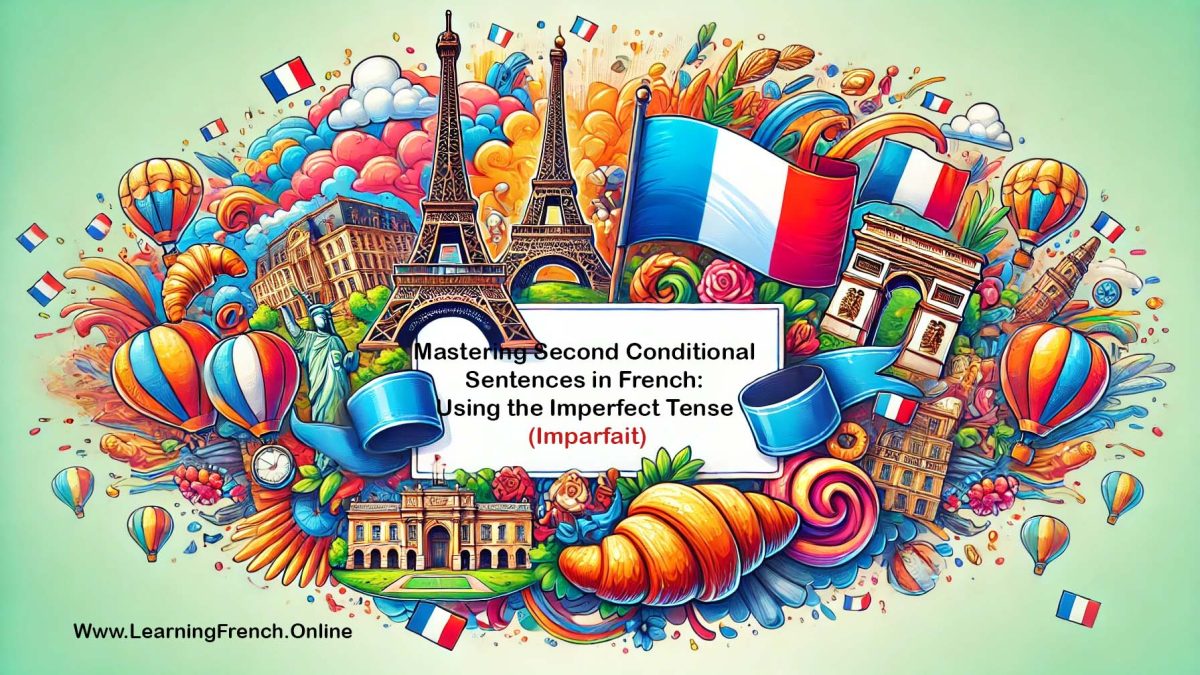
Understanding Second Conditional Sentences in French: A Comprehensive Guide for Intermediate Learners
August 27, 2024
Mastering Combined Object Pronouns in French: A Comprehensive Guide for Intermediate Learners
August 28, 2024Mastering Second Conditional Sentences in French: Using the Imperfect Tense (Imparfait)
As you advance in learning French Grammar, especially at the B1 level, understanding how to express hypothetical situations becomes crucial. The Second Conditional is an essential grammar structure that allows you to discuss unreal or unlikely situations, often involving wishes, advice, or dreams. To use the Second Conditional effectively, you must have a solid grasp of the Imparfait (Imperfect Tense), which plays a critical role in forming these sentences. This article will provide a comprehensive guide on how to use the Second Conditional in French Grammar, focusing on the use of the Imparfait, with detailed explanations, examples, and practical tips.
What is the Second Conditional?
The Second Conditional is used to talk about hypothetical situations that are unlikely or impossible in the present or future. It allows you to express what you would do if things were different. In French, the Second Conditional typically involves a “si” (if) clause using the Imparfait and a main clause using the Conditionnel Présent.
Understanding the Imparfait
The Imparfait is the tense used in the “si” clause of the Second Conditional. It is used to describe actions or states that were ongoing or repeated in the past. When used in conditional sentences, the Imparfait helps create a hypothetical or unreal situation.
How to Form the Imparfait
To form the Imparfait, start with the nous form of the verb in the present tense, remove the -ons ending, and add the following endings:
- -ais (je)
- -ais (tu)
- -ait (il/elle/on)
- -ions (nous)
- -iez (vous)
- -aient (ils/elles)
Examples of Imparfait:
- Parler (to speak): je parlais, tu parlais, il parlait, nous parlions, vous parliez, ils parlaient
- Finir (to finish): je finissais, tu finissais, il finissait, nous finissions, vous finissiez, ils finissaient
- Vendre (to sell): je vendais, tu vendais, il vendait, nous vendions, vous vendiez, ils vendaient
Forming the Second Conditional in French
The Second Conditional in French consists of two parts:
- The “Si” Clause: This clause uses the Imparfait tense to set up the hypothetical scenario.
- The Main Clause: This clause uses the Conditionnel Présent to describe what would happen in that hypothetical situation.
Basic Structure:
- Si + Imparfait, Conditionnel Présent
Example:
- Si j’avais plus de temps, je lirais plus de livres. (If I had more time, I would read more books.)
Usage of the Second Conditional with Imparfait
The Second Conditional is used in various contexts to express hypothetical or unreal situations. Here’s a breakdown of its common uses:
1. Expressing Unreal or Hypothetical Situations
Use the Second Conditional to describe situations that are contrary to reality or unlikely to occur.
Examples:
- Si j’étais riche, je voyagerais autour du monde. (If I were rich, I would travel around the world.)
- Si elle parlait mieux français, elle trouverait un emploi facilement. (If she spoke French better, she would find a job easily.)
2. Expressing Wishes or Desires
The Second Conditional is ideal for expressing wishes about situations that are not true, often involving a sense of regret or longing.
Examples:
- Si je pouvais, je vivrais à Paris. (If I could, I would live in Paris.)
- Si nous avions une voiture, nous irions à la plage. (If we had a car, we would go to the beach.)
3. Giving Advice or Making Suggestions
This structure is also used to give advice or make suggestions in a polite, hypothetical manner.
Examples:
- Si j’étais toi, je parlerais au professeur. (If I were you, I would talk to the teacher.)
- Si tu voulais réussir, tu travaillerais plus dur. (If you wanted to succeed, you would work harder.)
Common Mistakes and How to Avoid Them
- Using the Present Tense Instead of Imparfait in the “Si” Clause:
- Incorrect: Si je suis riche, je voyagerais. (Using the present tense instead of Imparfait)
- Correct: Si j’étais riche, je voyagerais. (Using Imparfait to indicate a hypothetical situation)
- Forgetting to Use the Conditionnel Présent in the Main Clause:
- Incorrect: Si j’avais le temps, je fais plus de sport. (Mixing tenses incorrectly)
- Correct: Si j’avais le temps, je ferais plus de sport. (Using Conditionnel Présent in the main clause)
- Misusing the Second Conditional for Likely Future Events:
- Incorrect: Si j’ai le temps demain, je ferais du sport. (This structure is better suited for the first conditional)
- Correct: Si j’ai le temps demain, je ferai du sport. (Using the Futur Simple for likely future events)
- Confusing the Imparfait with the Conditionnel Présent:
- Incorrect: Si je pouvais, je vivrai en France. (Mixing tenses incorrectly)
- Correct: Si je pouvais, je vivrais en France. (Using both Imparfait and Conditionnel Présent correctly)
Practice Exercises
Here are some exercises to help reinforce your understanding of the Second Conditional using the Imparfait:
1. Complete the sentences with the correct form of the verb in the Imparfait and Conditionnel Présent:
- Si je _ (avoir) de l’argent, je _ (acheter) une nouvelle voiture.
- Si tu _ (savoir) la réponse, tu _ (réussir) l’examen.
- Si nous _ (pouvoir) partir maintenant, nous _ (arriver) à temps.
- Si elle _ (être) plus gentille, elle _ (avoir) plus d’amis.
- Si vous _ (travailler) dur, vous _ (obtenir) une promotion. Answers:
- Si j’avais de l’argent, j’achèterais une nouvelle voiture.
- Si tu savais la réponse, tu réussirais l’examen.
- Si nous pouvions partir maintenant, nous arriverions à temps.
- Si elle était plus gentille, elle aurait plus d’amis.
- Si vous travailliez dur, vous obtiendriez une promotion.
2. Translate the following sentences into French using the Second Conditional:
- If I were the president, I would change the education system.
- If they knew the truth, they would be disappointed.
- If we had more time, we would visit more places.
- If you spoke French fluently, you would find a job easily.
- If I had known earlier, I would have come. Answers:
- Si j’étais le président, je changerais le système éducatif.
- S’ils savaient la vérité, ils seraient déçus.
- Si nous avions plus de temps, nous visiterions plus d’endroits.
- Si tu parlais couramment le français, tu trouverais un emploi facilement.
- Si j’avais su plus tôt, je serais venu.
3. Identify and correct the errors in the following sentences:
- Si je suis riche, j’achèterais une maison à la campagne.
- Si elle savait la réponse, elle passe l’examen.
- Si nous pouvions, nous irions en voyage demain.
- Si tu as plus de temps, tu travaillerais sur ton projet.
- Si vous étiez plus organisés, vous finissez le travail à temps. Corrected Sentences:
- Si j’étais riche, j’achèterais une maison à la campagne.
- Si elle savait la réponse, elle passerait l’examen.
- Si nous pouvions, nous irions en voyage demain.
- Si tu avais plus de temps, tu travaillerais sur ton projet.
- Si vous étiez plus organisés, vous finiriez le travail à temps.
Cultural Insights: Using the Second Conditional in French Conversation
- Politeness and Softness: The Second Conditional is often used in French to soften requests or suggestions. This reflects the French preference for diplomacy and tact in social interactions. For instance, saying “Si vous pouviez m’aider, ce serait génial” (If you could help me, that would be great) is a polite way to ask for assistance.
- Expressing Dreams and Desires: The Second Conditional is commonly used to talk about dreams, desires, and regrets in French. Whether in literature, films
, or everyday conversations, this structure allows speakers to explore hypothetical scenarios, making it an important tool for deeper, more nuanced discussions.
- Hypothetical Discussions: French speakers often use the Second Conditional to discuss hypothetical situations, whether in casual conversation or more formal debates. Understanding how to use this structure correctly will help you engage in these discussions more effectively.
Conclusion
The Second Conditional is a vital aspect of French grammar, especially for B1-level learners. By mastering this structure and understanding how to use the Imparfait in hypothetical situations, you can significantly enhance your ability to express complex ideas, wishes, and possibilities in French.

